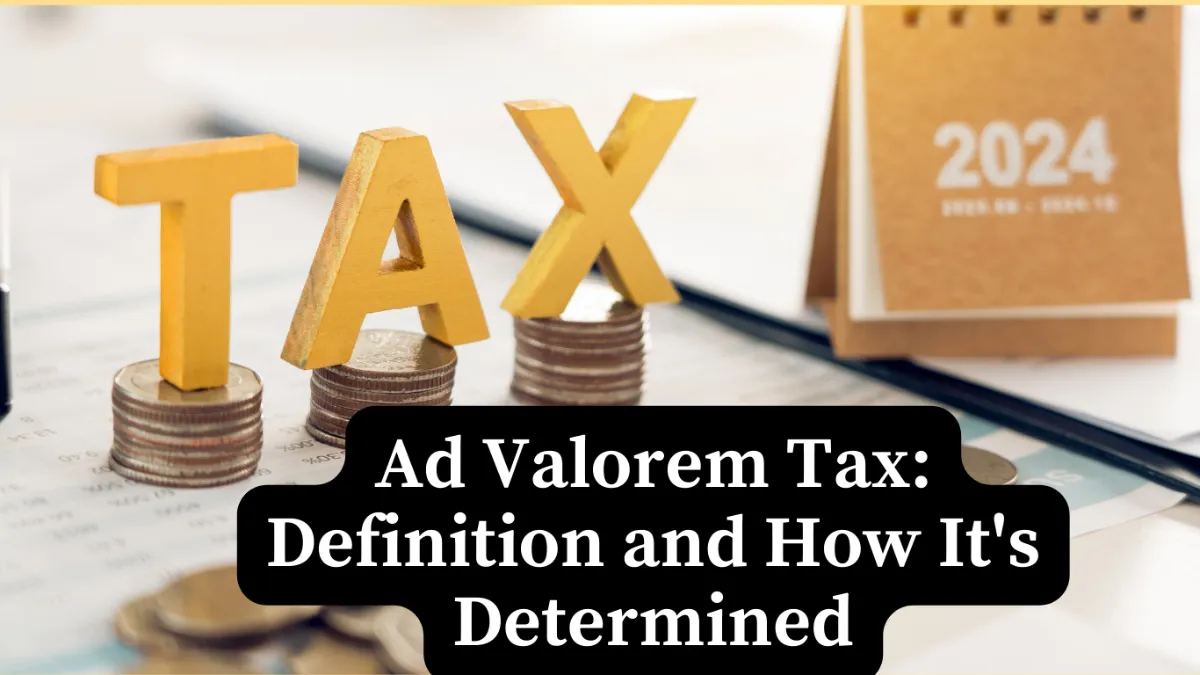Ad Valorem Taxes are based on the assessed worth of an item. The Latin term “ad valorem” means “according to value.” This type of tax is frequently levied on property and goods, with the tax amount fluctuating in proportion to the value of the object under consideration. Here is the detail description of the concept:
Table of Contents
What Is the Ad Valorem Tax?
Ad valorem taxes are imposed by the government and computed based on the worth of an item or property. Ad valorem taxes differ from flat-rate taxes in that they are based on a percentage rather than a fixed sum regardless of value. These taxes are typically used for:
Real estate taxes are frequently ad valorem, which means they are levied based on the worth of the property.
Vehicle registration costs may include ad valorem taxes based on the vehicle’s market value.
Sales taxes are classified as ad valorem in some countries because they are levied on the price of goods or services sold.
How Ad Valorem Tax Works
The procedure of applying ad valorem taxes consists of numerous steps:
Valuation refers to determining the market worth of a taxed item.
Assessment: The tax rate is applied to the assessed value to calculate the tax due.
Collection: Taxpayers must pay the assessed tax amount within a set timeframe.
Example : Ad Valorem Tax
For example, if a property is worth $300,000 and has a 1.5% local property tax rate, the ad valorem tax is:
Tax: = Value × Tax Rate = $ 3,000,000 × 0.015 = $ 4,500
The tax rate is calculated as $300,000 multiplied by 0.015, which is $4,500.
Also View: Mutual Funds Vs Equity: Which one is Better Investment?
How are ad valorem taxes levied?
Municipalities and counties often levy ad valorem taxes on an annual basis. Let’s take a deeper look at how these taxes are imposed in various situations:
Property taxes: Local governments assess the value of real estate properties and impose taxes accordingly. Property tax rates and assessment techniques vary greatly by area.
Sales taxes are levied at the moment of sale and are calculated depending on the purchase price of products or services. Sales taxes can be levied by the state, local government, or a special district.
Import Duties: Customs duties on imported products are sometimes ad valorem, or determined as a proportion of the item’s declared worth.
Determining Tax Values
Ad valorem taxes can be determined using a variety of valuation methods:
Market Value: The most frequent way for determining value is to consider what a willing buyer would pay a willing seller in the open market.
Assessed Value: A proportion of market value determined by a government assessor to lessen the tax load on owners.
Depreciated Value: For assets such as vehicles, taxes may be calculated using the depreciated value rather than the original purchase price.
Property is subject to ad valorem taxes
Ad valorem taxes apply to a wide range of properties and assets, including:
Real estate: Real estate taxes are based on the assessed value of both residential and commercial properties.
Personal property: Personal property includes mobile assets such as cars, boats, and machines.
Luxury objects: In some countries, high-value objects such as jewelry or artwork may be subject to ad valorem taxation.
FAQs
How frequently are ad valorem taxes reassessed?
The frequency of reassessments varies by jurisdiction. Property taxes can be reassessed annually, biennially, or at other intervals determined by municipal regulations.
Can ad valorem taxes be appealed?
Yes, property owners can often appeal the assessed value if they believe it does not accurately reflect the fair market value. This process usually entails submitting proof to the local tax board or assessor’s office.
Is ad valorem tax deductible?
Ad valorem taxes on real estate may be deducted from federal income taxes in certain circumstances. This is determined by the country’s tax regulations and the precise deductions that are available.
How are ad valorem taxes different from specific taxes?
Specific taxes are fixed amounts per unit of products or services (for example, excise taxes), whereas ad valorem taxes fluctuate according to the item’s worth.
What factors can alter the value of ad valorem taxes?
Factors to consider include market circumstances, property improvements or alterations, and comparable sales data in the area.
Understanding ad valorem taxes is critical for both property owners and consumers, as they can dramatically increase the cost of holding and transferring assets.

